Think you already know everything you need to know for your Vietnam Trip? Don’t be so sure! Before you book anything, check out this list of 24 Things Every Traveler Should Know Before Coming To Vietnam.
The majority of the Vietnam Travel Advice found online are repetitive or mostly based on common sense. This article provides a list of 24 things that most travelers to Vietnam probably won’t be aware of, and may save you from making some expensive mistakes during your trip!
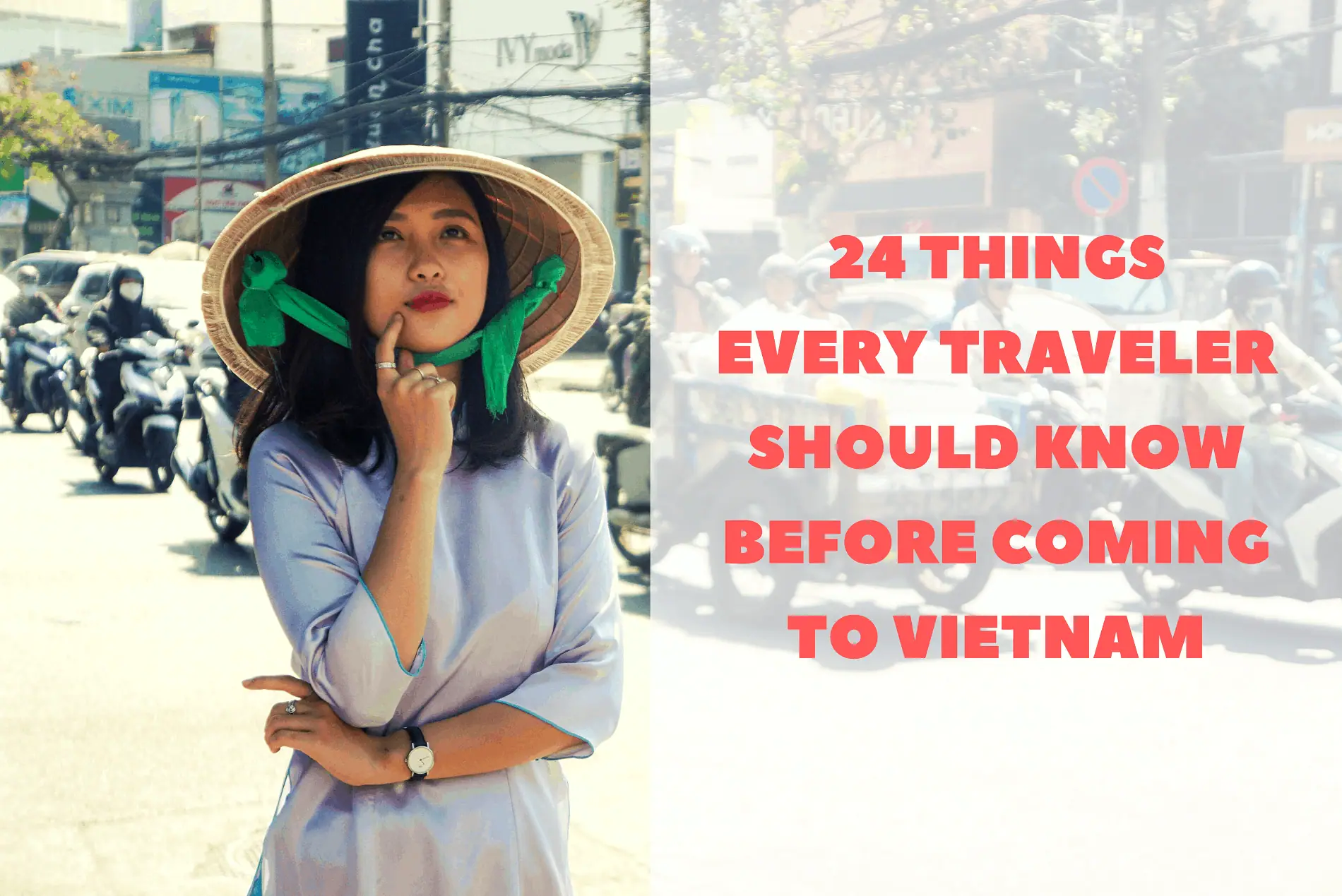
TABLE OF CONTENTS:
(Click on the links below to jump directly to the section you would like to explore)
- The Weather Can Vary Drastically in North, Central and South Vietnam
- For most travelers, TET is a terrible time to come to Vietnam
- Beware: The Wet Bathroom Floors
- Cheap Laundry Services Are Everywhere So No Need To Overpack
- Mattresses in Vietnam are Rock Hard
- You Won’t Be Allowed to Share A Hotel Room With A Vietnamese Friend
- Most Hotels Will Ask To Keep Your Passport (But don’t let them!)
- AirBnBs Can Save Families A Lot Of Money
- Hotels and Tours in Vietnam Are Plagued with Fake Reviews
- Tripadvisor is A Terrible Place to Book Tours (And usually more expensive!)
- Free Student Tours Are Very Popular And Can Book Out Weeks In Advance
- Your Old or Torn Bills Won’t Be Accepted in Vietnam
- Most Places In Vietnam Do Not Accept Credit Cards
- Never Pay in US Dollars (or in any foreign currency!)
- Some Vaccinations Need To Be Administered Months in Advance
- Emergency Care in Vietnam is Pretty Terrible, So Don’t Skimp On Travel Insurance
- Domestic Flights in Vietnam Are Frequently Delayed, Especially Budget Airlines
- Sleeper Buses Are Really Cheap, And A Great Travel Option For Small Budgets
- Pillowcases and Bedding On Public Transport Are Often Filthy
- You Won’t Be Allowed To Drive A Rental Car
- The Grab App Will Help You Avoid The Most Common Vietnam Scam
- Vietnamese People Probably Won’t Take Your Food Allergies Seriously
- What is Legal In Your Country May Be Illegal In Vietnam
- The Vietnam E-visa Is The Best Visa Option For Most Travelers
1. The Weather Can Vary Drastically In North, Central and South Vietnam
The weather will be the most important factor in determining what you pack for your trip. If you’re only staying in South Vietnam for example, there is no need to bring cold-weather clothing. If you’re traveling in Northern Vietnam between November and March, you should pack some sweaters, thermals, and other warm clothing. And Central Vietnam often floods during the monsoon season which usually occurs between October and December, so you might want to bring a good rain jacket.
Coats and North face jackets can be bought cheaply in Vietnam, but other cold-weather gear can be hard to find and is best bought at home.
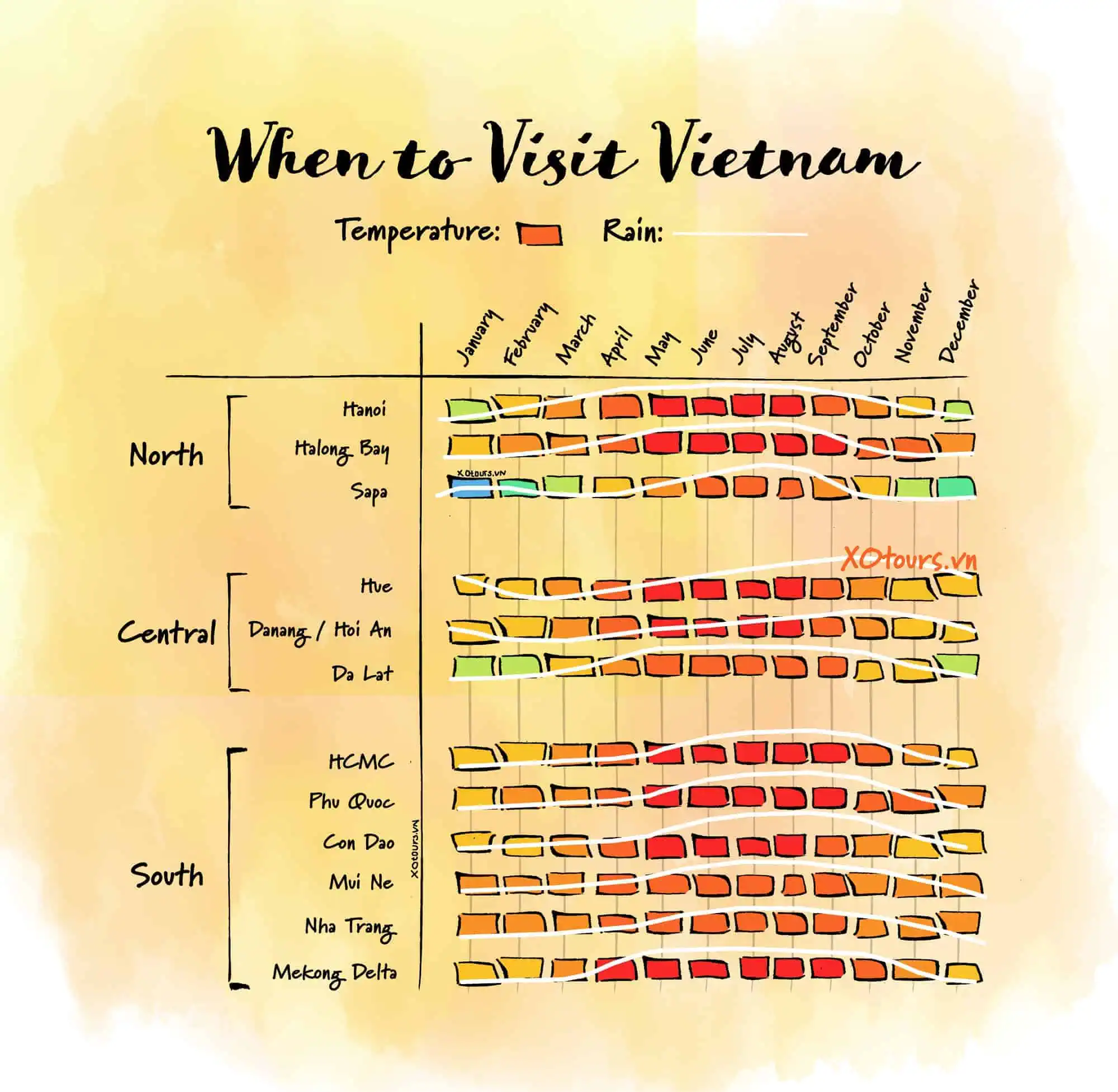
2. For Most Travelers, TET Is A Terrible Time To Come To Vietnam
Tet (Lunar New Year) is the most important holiday in Vietnam, so it might seem like a nice idea to visit Vietnam during Tet. Unless you are invited by a local family into their home or plan to spend the entire week of TET at the beach however, we would recommend not traveling to Vietnam during this time of year. The larger cities in Vietnam will almost be completely deserted during TET, and most businesses will shut down. Travelling is also much more expensive during this time of year, and will likely cost you 2-3 times the normal price. If you’ve already booked your trip during TET, don’t fret, however. Although most markets and restaurants will shut down for 7 days, the main tourist attractions will still be open, and because there is so much less traffic in the big cities, it’s less dangerous to cross the streets and you will be able to grab some great hotel bargains.
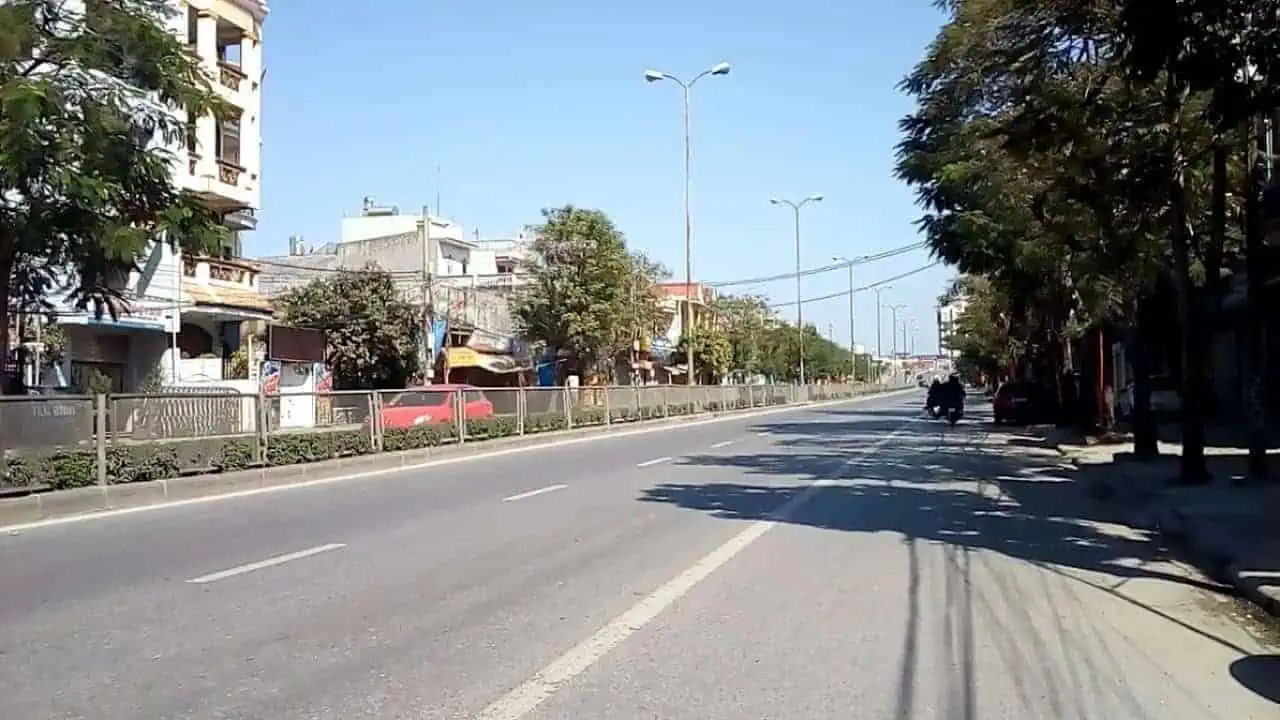
3. Beware: The Wet Bathroom Floors
In Vietnamese bathrooms, there is generally no barrier between the shower area and the toilet area. The good news is, it makes cleaning the bathroom easy. The bad news is the entire bathroom floor will often be wet if anyone has showered recently. Mold and bacteria grow more easily in wet environments so most locals keep separate sandals at the entrance to the bathroom to keep their feet clean. And nobody likes to climb into bed with damp feet. So remember to bring an extra pair of flip-flops or Crocs to use in the restrooms. This won’t be an issue in some of the more modern hotels which will have separators for the shower and bathroom areas.
Some “westerner-friendly” bathrooms, like the ones at international hotels, do indeed have a bathroom separation. Check your hotel booking to see if you’ll need to bring a pair of bathroom sandals.
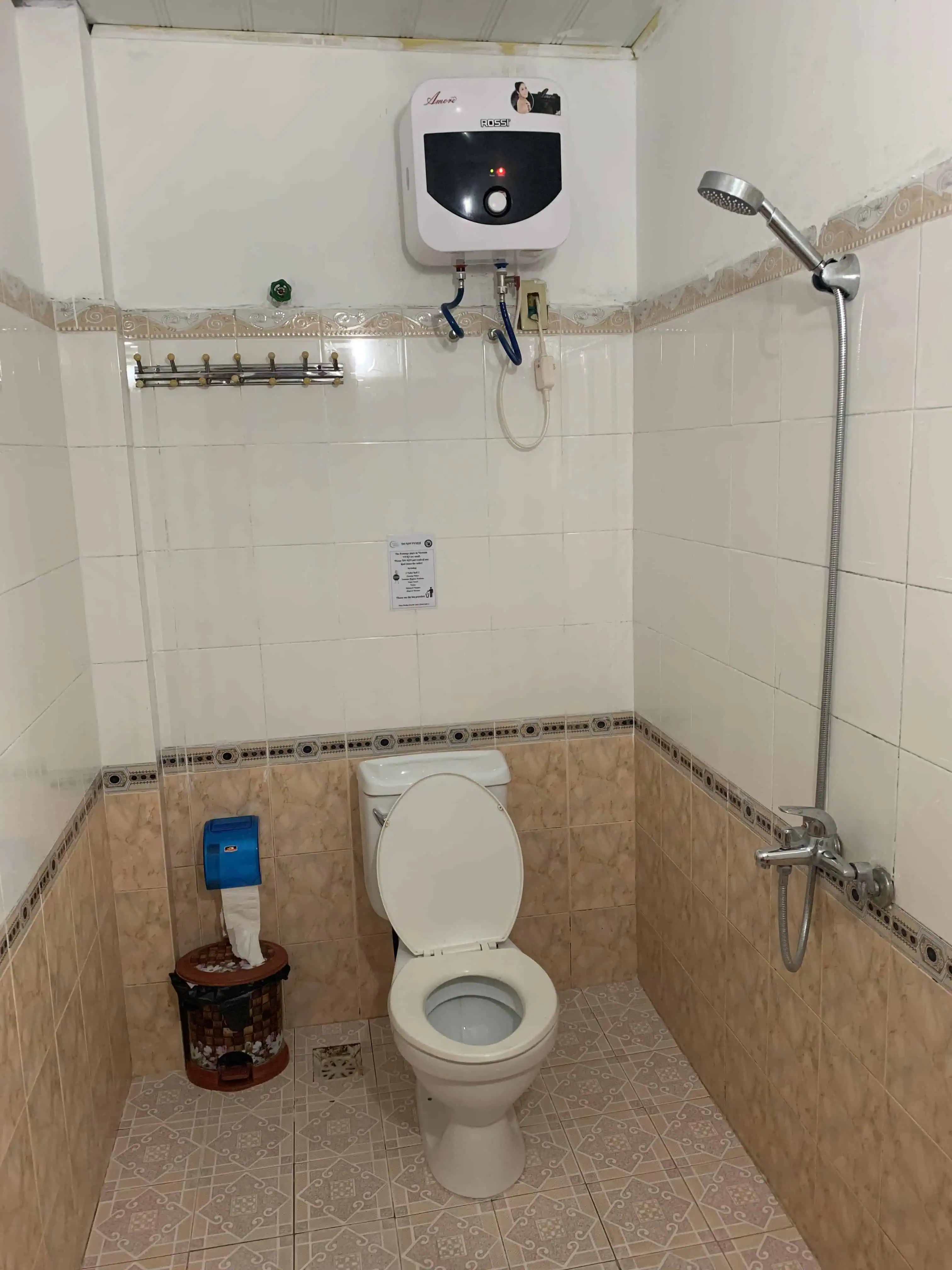
4. Cheap Laundry Services Are Everywhere So No Need To Overpack
Fluff-and-fold laundry places are everywhere in Vietnam. You should never have to walk more than a block or three in big Vietnamese cities to find one. They do a great job, they’re fairly quick, and they are very cheap; generally around 12k ($0.50) per kilogram (1.2 lbs) at a place on the street. Just hand one of these places a bag of clothes, making note if any of them are especially dirty and require extra attention. 24 hours later you’ll get them back washed, softened, sun-dried, and neatly folded.
Because it’s so easy to get laundry done in Vietnam, you don’t need to pack an outfit for every single day you are here. For a three-week trip, for example, you can pack eight outfits and plan a laundry run once a week.
Vietnamese laundries Sun dry clothes whereas most western laundries use dryers that will shrink the clothes the first time they are dried. Keep this in mind for the clothes that you buy in Vietnam.
Note: Some hotels in Vietnam offer laundry services for exorbitant prices, like $0.50 per item. If money is an issue, it’s best to make the short walk to a local fluff-and-fold instead.
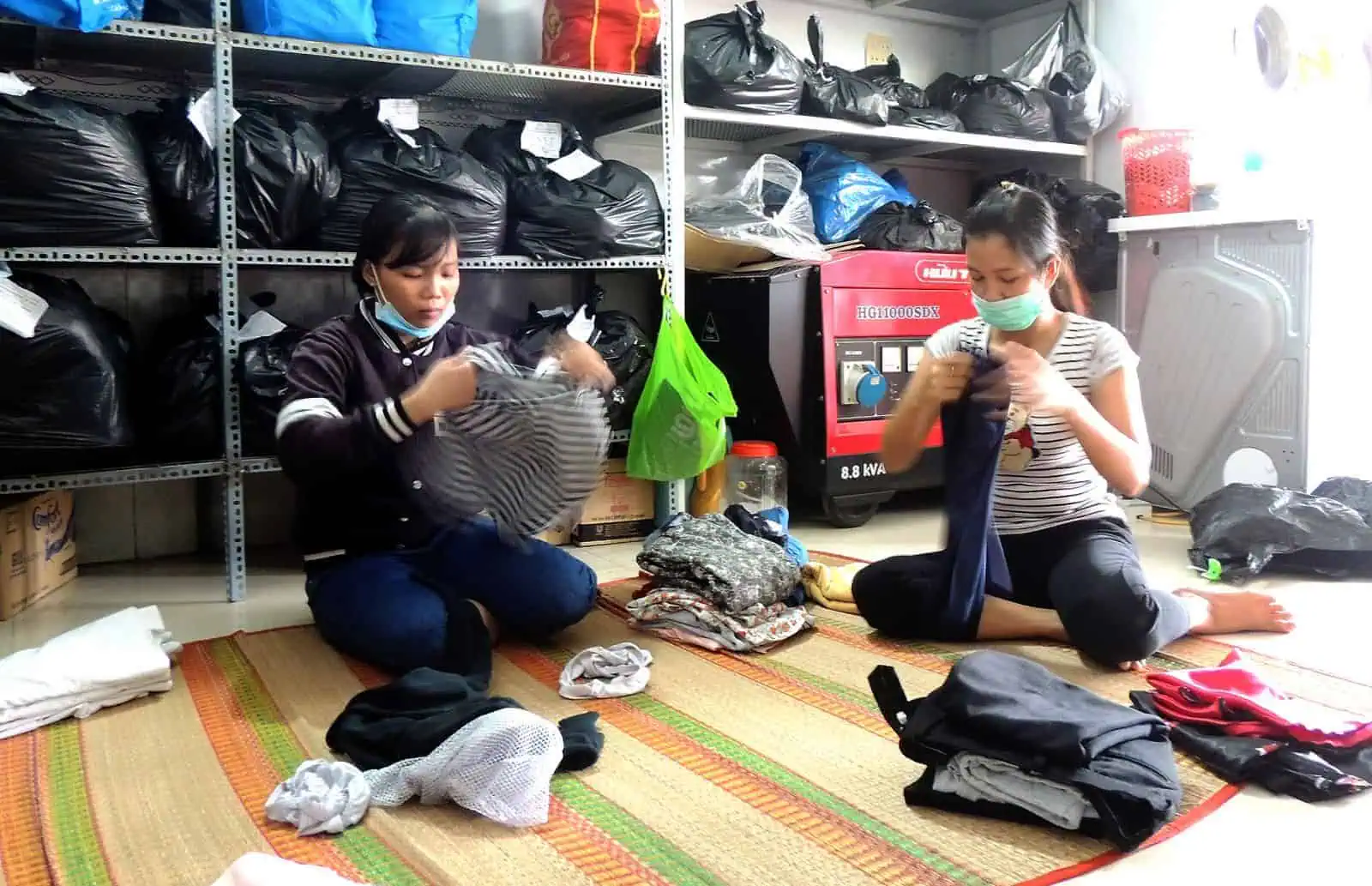
5. Mattresses In Vietnam Are Rock Hard
Many hotel mattresses in Vietnam are firm or even straight-up rock hard because of an old but untrue Vietnamese belief that sleeping on a soft surface will warp your spine. If sleeping on a hard mattress is an issue for you, be sure to look for reviews mentioning the beds at a hotel before you book. Large chain hotels may be able to supply you with an air mattress if you ask. At small hotels or AirBNBs, you’re probably out of luck if the beds are too hard.
6. You Won’t Be Allowed to Share A Hotel Room With a Vietnamese Friend
Vietnamese law prohibits non-Vietnamese people from staying with a Vietnamese person in a hotel. The exceptions are married couple and family, and you need to be able to prove that relationship to the hotel. Note that this rule is often broken, so not all hotels will enforce it. Still, it’s best to prepare for the possibility if you are planning on staying in a hotel with a Vietnamese friend. If you simply roll up to a hotel with a Vietnamese friend in tow, the hotel may require you to book separate rooms.
7. Most Hotels Will Ask To Keep Your Passport (But don’t let them!)
Many hotels will ask to keep your passport during your stay. Allowing someone else to keep your passport is risky, however, because they are not the ones who will be inconvenienced if your passport is lost or stolen. For instance, one of our guests’ hotel misplaced her passport and she had to stay an extra 3-4 days in HCMC to get an emergency passport while the rest of her friends continued on their travels, which cost her a lot of time and money.
Since your hotel only needs your passport info (to register your stay with the local police) and not the physical passport itself, most will accept a photocopy of your passport page. We recommend leaving your passport in the hotel safe or in a secured luggage.
If you forget to make photocopies of your passport before coming to Vietnam, rest assured that photocopy shops are cheap and plentiful in Vietnamese cities. Still, it’s a good idea to make a few copies of your passport page before you leave home so that you can avoid the headache.
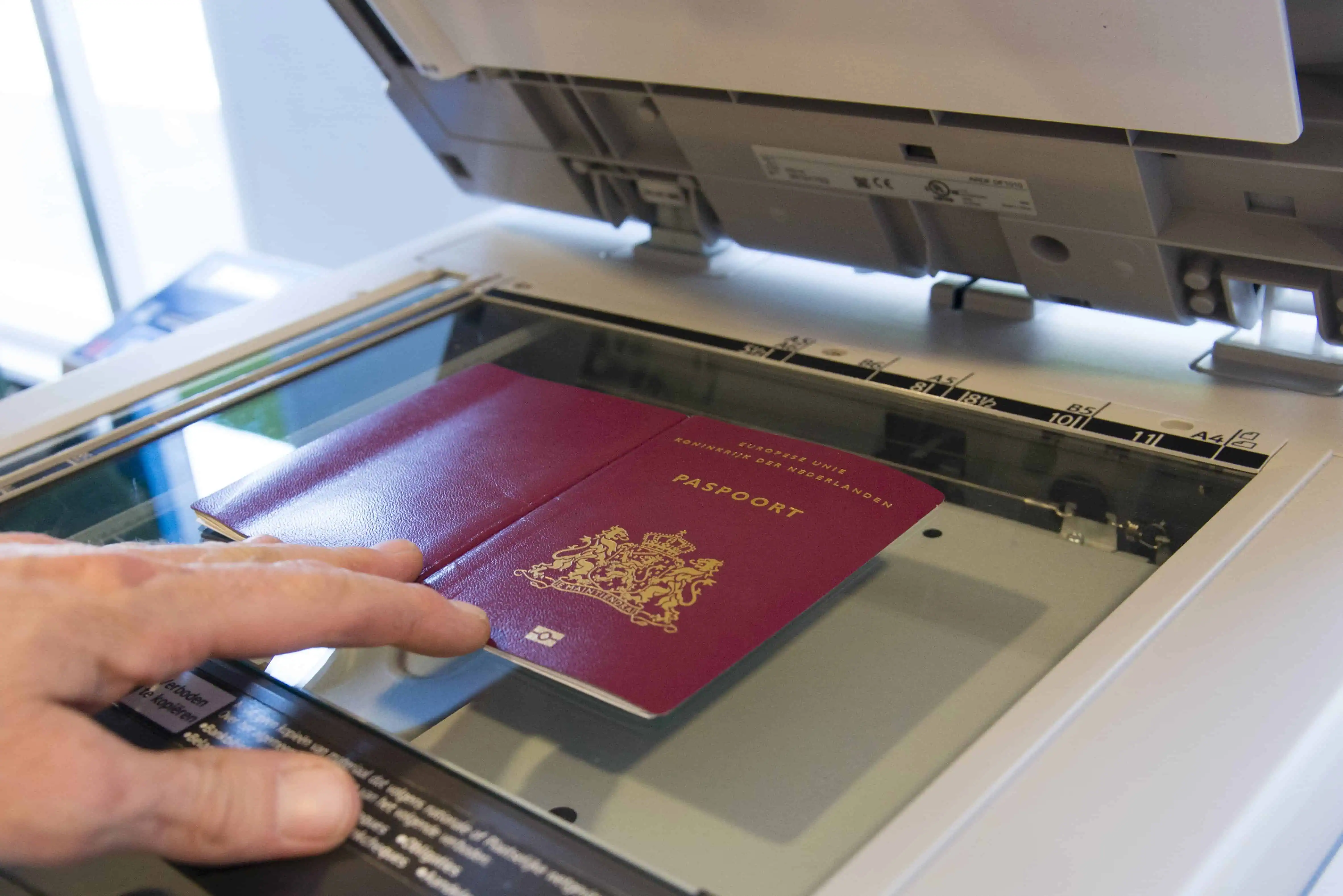
8. AirBnBs Can Save Families A Lot Of Money
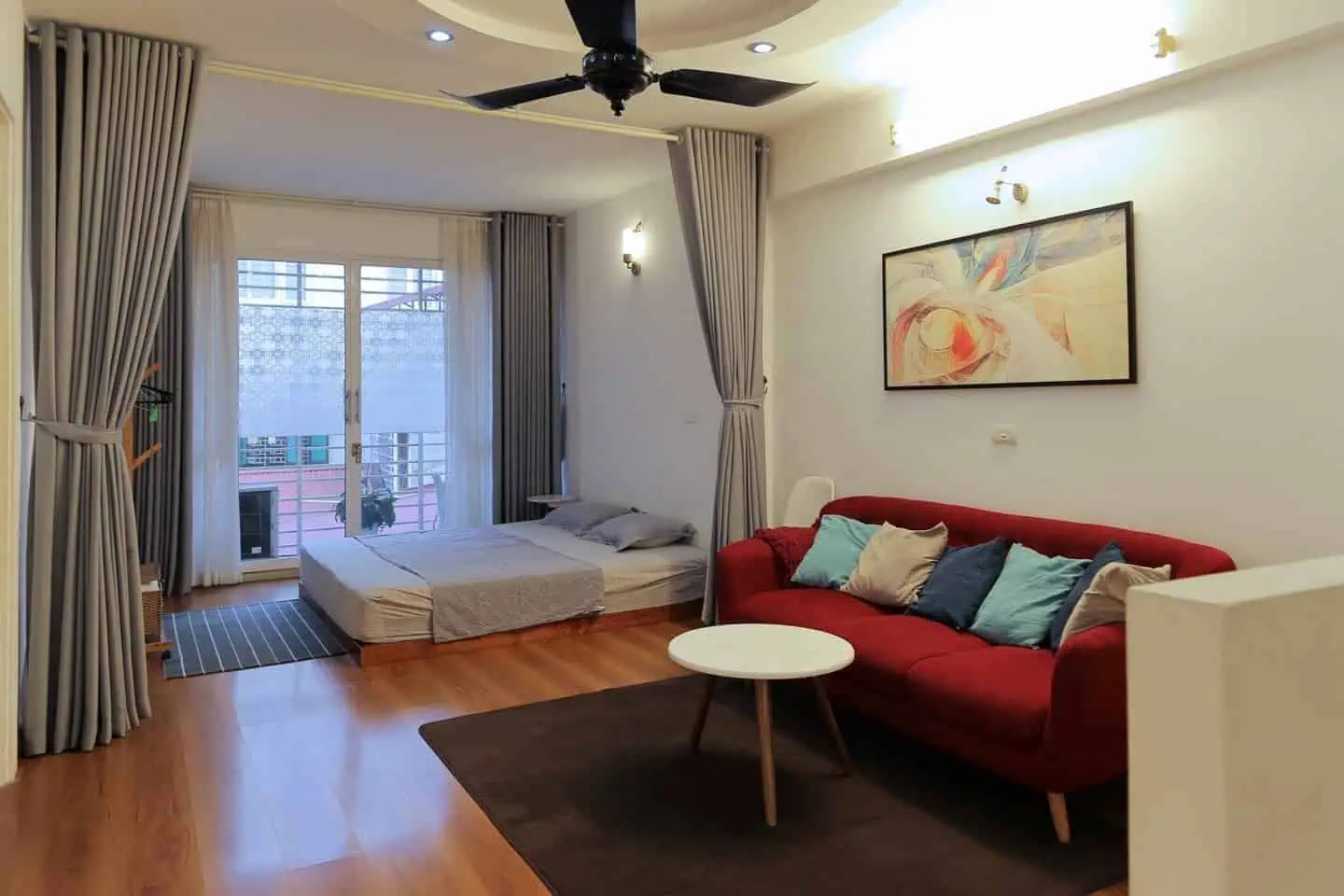
Airbnb is extremely popular in Vietnam and accommodations listed on the site are often much cheaper than hotels. Because of this, they’re a great option for families traveling in Vietnam that want to stay together and not have to rent multiple hotel rooms at a much higher cost. For instance, you can rent a nice 3 bedroom apartment with swimming pool on AirBNB for much cheaper than the equivalent space at a hotel. The quality of the places listed on Airbnb varies drastically though, so do we recommend reading reviews thoroughly before booking.
Staying at an AirBNB is also a good option if you want to stay with a Vietnamese friend or for some reason cannot supply your passport or copies.
9. Hotels and Tours in Vietnam Are Plagued With Fake Reviews
Lots of the hotel/Airbnb tips above involve reading reviews. Unfortunately, Vietnam’s tourism and hospitality industry are plagued with fake reviews. Yes, we know this is a worldwide issue however this problem seems to be especially egregious in Vietnam.
Hotel managers and tour operators will often create dozens of fake accounts on booking and travel sites praising their own business while trying to sabotage their competitors. Some businesses even offer discounts in exchange for 5-star reviews from their customers.
Here are two effective ways to filter out the majority of fake reviews.
- Find reviews on Facebook. It is much more difficult for a single person to make multiple Facebook accounts than on sites like Tripadvisor that only require an email address to create a new account. Also if a Facebook reviewer doesn’t have a profile picture and more than a handful of friends then we can probably assume the account is fake.
- Discount reviews from 1-time reviewers. Although we’re sure there are a small percentage of real reviewers that only write a single review and stop, it is pretty obvious that the reviews of a business is fake if the majority of the reviews are from 1 and done reviewers, which seems is the case with many if not most hospitality businesses in Vietnam.
Tripadvisor is especially guilty of fake reviews, so take its recommendations with a very large grain of salt.
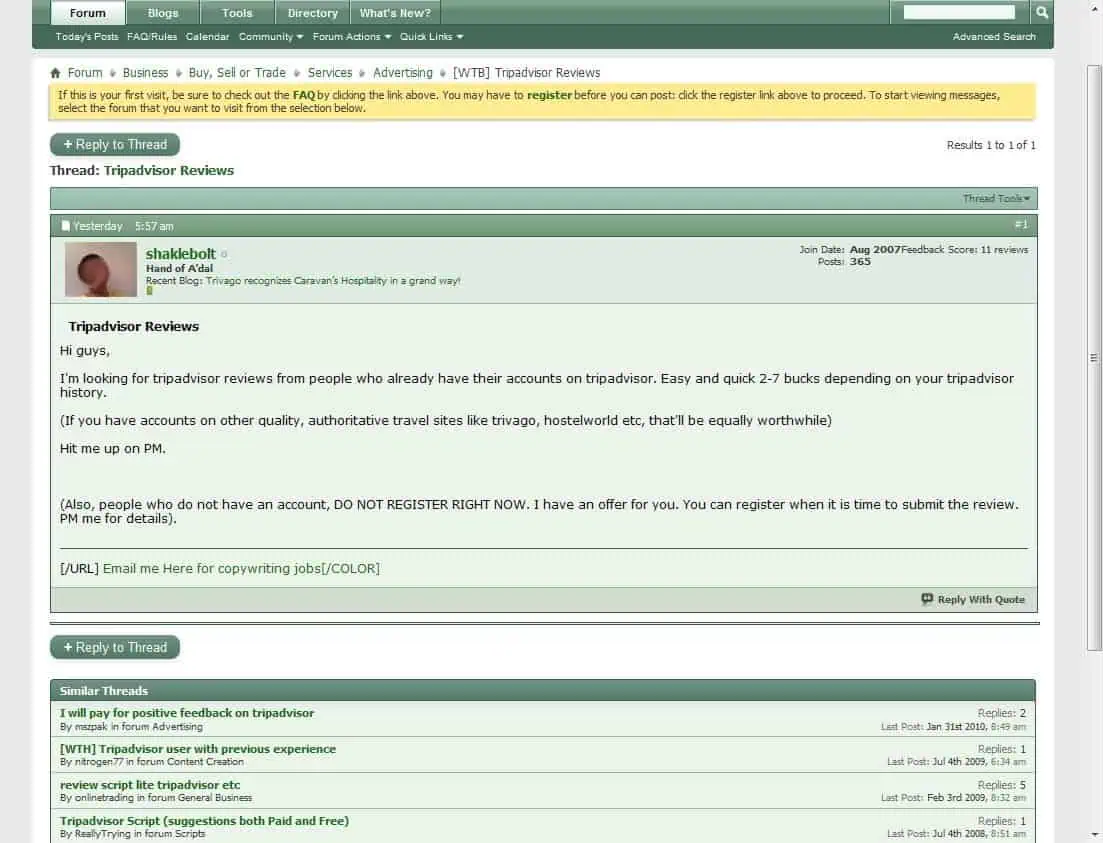
10. Tripadvisor Is A Terrible Place To Book Tours (And usually more expensive!)
Notwithstanding the issue of fake reviews we mentioned earlier, we think Tripadvisor is a terrible place to book tours. Although Tripadvisor can be a great tool for researching the kind of activities a place offers and getting advice from fellow travelers in the many travel forums, you probably won’t discover some of the best tour operators on Tripadvisor anymore. That’s because Tripadvisor stopped showing the organic rankings of the tour and activity businesses listed on its website since April 2018. Around that period, they started to only promote the tour and activity businesses that sell their tours directly on Tripadvisor and pay a huge commission for the privilege. For instance, it’s almost impossible for a traveler to discover XO Tours on Tripadvisor now (without navigating through a maze of menus) because we refuse to pay Tripadvisor a huge commission to list our tours. So unless you already know about our business, it’s unlikely you will ever accidentally come across XO Tours on the site.
Another thing to keep in mind is that many businesses that sell their tours on Tripadvisor actually raise their prices on Tripadvisor to cover the commission they have to pay to the company, so often times you can book the same tour a lot cheaper if you book directly through the business. It’s a good strategy to find something that looks good on Tripadvisor, cross-reference it with other sources, and then head to the company’s site to book. Even if you find that the price of a tour is the same on a business’s website as on Tripadvisor, at least your money will go towards supporting the local business instead of going into the pocket of a corporate machine.
11. Free Student Tours Are Very Popular And Can Book Out Weeks In Advance
Free student-led tours are not only great for budget travelers, but they are also a great way to meet locals and learn more about life in Vietnam. Some of the more well-known student tour organizations like “Hanoi Kids” and “Saigon Hotpot” have huge demand, so don’t expect to be able to book spots with one of these organizations on just a few days notice. We would recommend booking these tours first once you have a firm itinerary for your Vietnam vacation.
When booking a free tour, please keep in mind that these types of tours are usually led by University students looking to improve their English and not professional licensed tour guides. This often means a less polished experience, but it also means you have more chances to get to know your guide on a personal level and maybe even make a new friend.
Be aware that many of the free student tours have started to incorporate motorbike tours into their offerings however we would warn against booking these types of free tours because the “guides” and drivers working for the free tours are not provided with professional training, and are therefore much less safe in our opinion. Additionally, if you get into an accident while on one of these tours, your travel insurance most likely will not cover you since the guides are not legally licensed. If you book a free tour, we would recommend sticking to walking tours or tours that offer a car transport option.
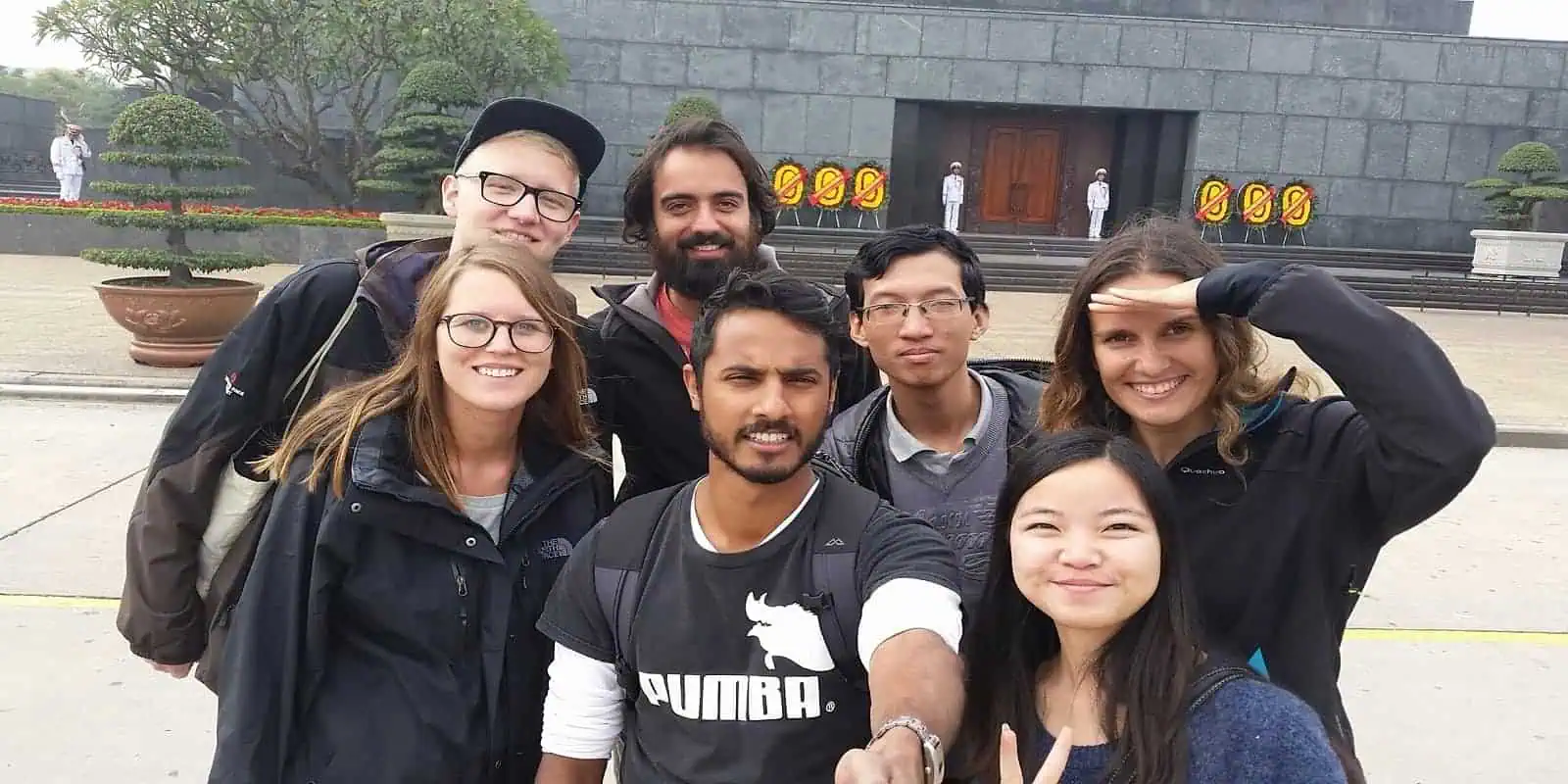
For a few great free tours throughout the country and ideas for other fun activities, check out our feature on what to do in Vietnam.
12. Your Old Or Torn Bills Won’t Be Accepted in Vietnam
Make sure the cash you are planning on bringing with you to exchange for Vietnamese Dong is in great condition if you want decent currency exchange rates. This means no pen markings, no tears (however small), and no significant creases. It might be a good idea to swing by a bank before you fly out to exchange your bills for crisp new ones. If you don’t, you’ll be charged an additional fee on the dirty notes, and some places might even refuse to exchange them entirely. Bonus tip: Larger denominations (e.g. $50 & $100 USD bills) will get you better exchange rates than smaller denominations.
Once you convert your currency into Vietnamese Dong, you can easily understand how the value each Vietnamese Dong note correlates to your own country’s currency by saving one of the convenient currency conversion tables found in the link below to your phone as a screenshot or background.
Vietnamese Dong Conversion Rate Tables for USD, AUD, GBP, CAD, NZD, EUR, SGD, CNY, KRW, JPY,
13. Most Places In Vietnam Do Not Accept Credit Cards
Once you settle on your budget for your trip, bump that figure up 25-50% and bring that much cash. The first reason for this is because of what we mentioned above: some of the money you bring may not be accepted for exchange, at least not at a good exchange rate. The second reason is that most places in Vietnam do not accept credit card payment, so you’ll always need to have lots of cash on hand.
Even better than bringing cash is bringing at least one no-fee credit card for use at one of the ATMs dotted around Vietnamese cities. For more info on that, check out our primer on money in Vietnam.
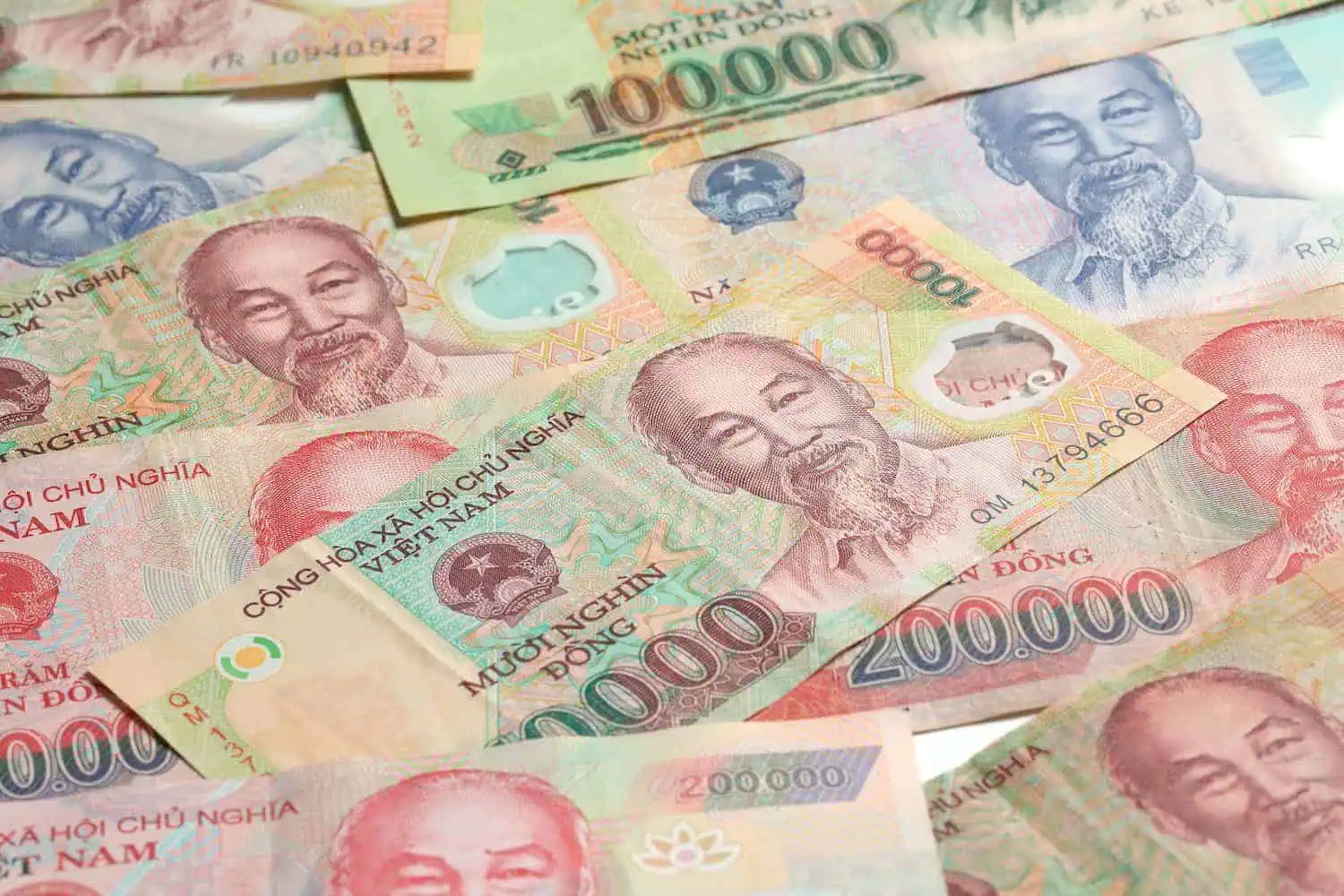
14. Never Pay In US Dollars (or in any foreign currency!)
Many businesses in Vietnam will quote prices in US Dollars, because it’s an easy way for travelers to get an idea of how much something costs in relation to their own currency. It is illegal for any local business to request payment in US Dollars or refuse payment in Vietnamese Dong, however.
We would highly recommend that you pay for everything in Vietnam in Vietnamese Dong if possible to ensure you’re not being scammed. If you pay in a foreign currency you are at the mercy of the vendor if they decide to give you a poor exchange rate.
15. Some Vaccinations Need To Be Administered Months In Advance
Some vaccinations, like Hepatitis B, Rabies, and Japanese Encephalitis, have to be administered 1-3 months in advance to take effect, so make an appointment with your doctor well in advance of your trip to Vietnam if you need to get them.
There is a myth that vaccinations are required to fly to Vietnam, but that’s not true. No one will turn you away from visiting the country if you do not get them. We’d strongly recommend getting the vaccinations advised to citizens of your country as per the nation-specific guidance in our section on Vietnam travel vaccinations. Without proper immunizations, you have a much higher risk of becoming sick in Vietnam.

16. Emergency Care in Vietnam Is Pretty Terrible, So Don’t Skimp On Travel Insurance
This is probably more common sense than anything else on this list, but we cannot stress enough the importance of dependable travel insurance. Healthcare in Vietnam isn’t great in general; especially in the smaller cities, so if you need emergency care you may have to be transported to Ho Chi Minh City, Danang or Hanoi, or even back to your own country which will certainly incur a high cost.
A few travel insurance providers popular among travelers to Vietnam include:
| Insurance Companies | Country of Origin |
|---|---|
| 1Cover | Australia |
| Aviva | Singapore |
| Holiday Extras | UK |
| Covermore | US |
| Southern Cross | New Zealand |
Most travel insurance plans do not cover more adventurous activities like motorbiking or trekking, though you can usually add coverage for these activities for an additional fee. Double-check what you’re getting before you buy.
Note: Counterfeit medication is prevalent in Vietnam so make sure to bring your own medication.
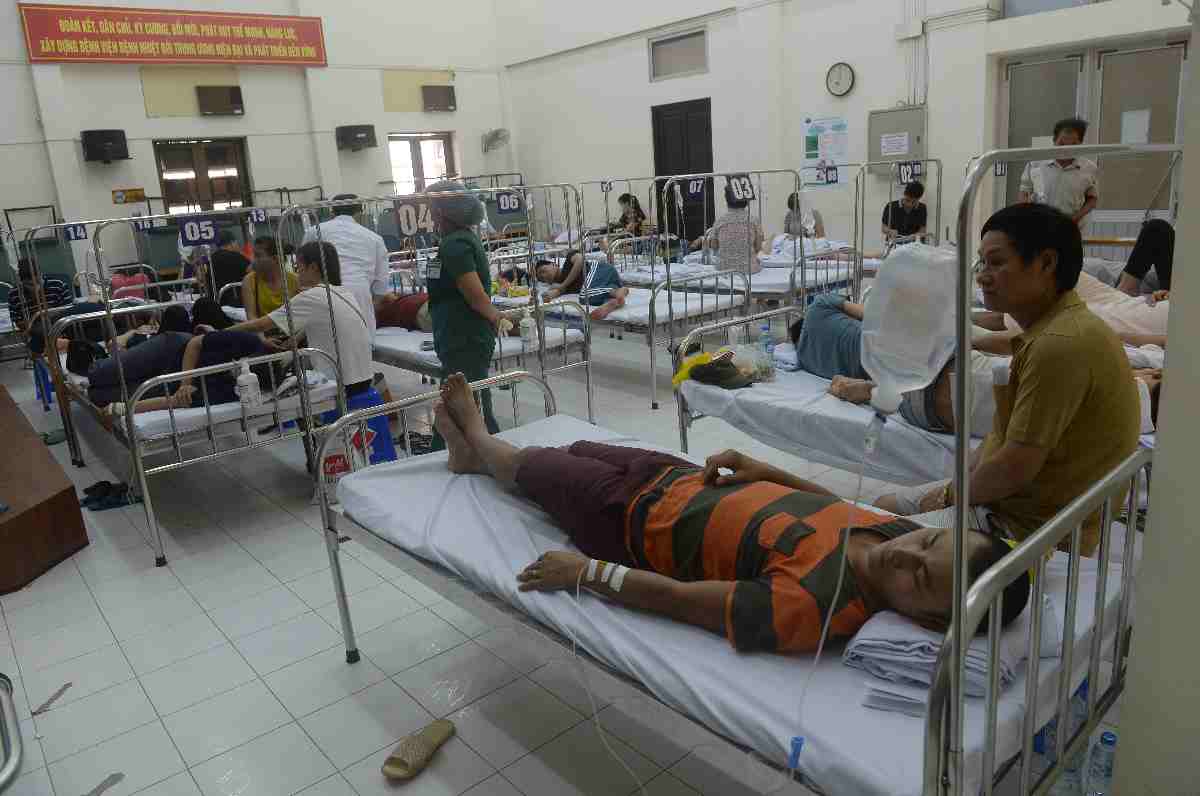
17. Domestic Flights In Vietnam Are Frequently Delayed, Especially Budget Airlines
- Many travelers prefer to book flights with the budget airlines in Vietnam (e.g Jetstar, Vietjet & Bamboo) because you can often book flights 50-75% cheaper than on Vietnam Airlines, the national carrier. Be aware, however, that there is a significant risk that your flight will be delayed a few hours or even canceled. If that sounds worth the savings, go for it. Also, keep in mind that the low prices on the budget carriers don’t include check-in luggage which can increase the price of each ticket dramatically.
- If your schedule isn’t flexible and/or you have a lot of check-in luggage we would recommend going with Vietnam Airlines. Flights are still relatively cheap compared to other countries and it is managed much more professionally than the budget airlines.
Protip: If you’re flying with a budget airline and have a tour booked at your destination for the same day, make sure they have a lenient cancellation/rebooking policy or you might be on the hook for a big cancellation fee if your flight is delayed or cancelled.
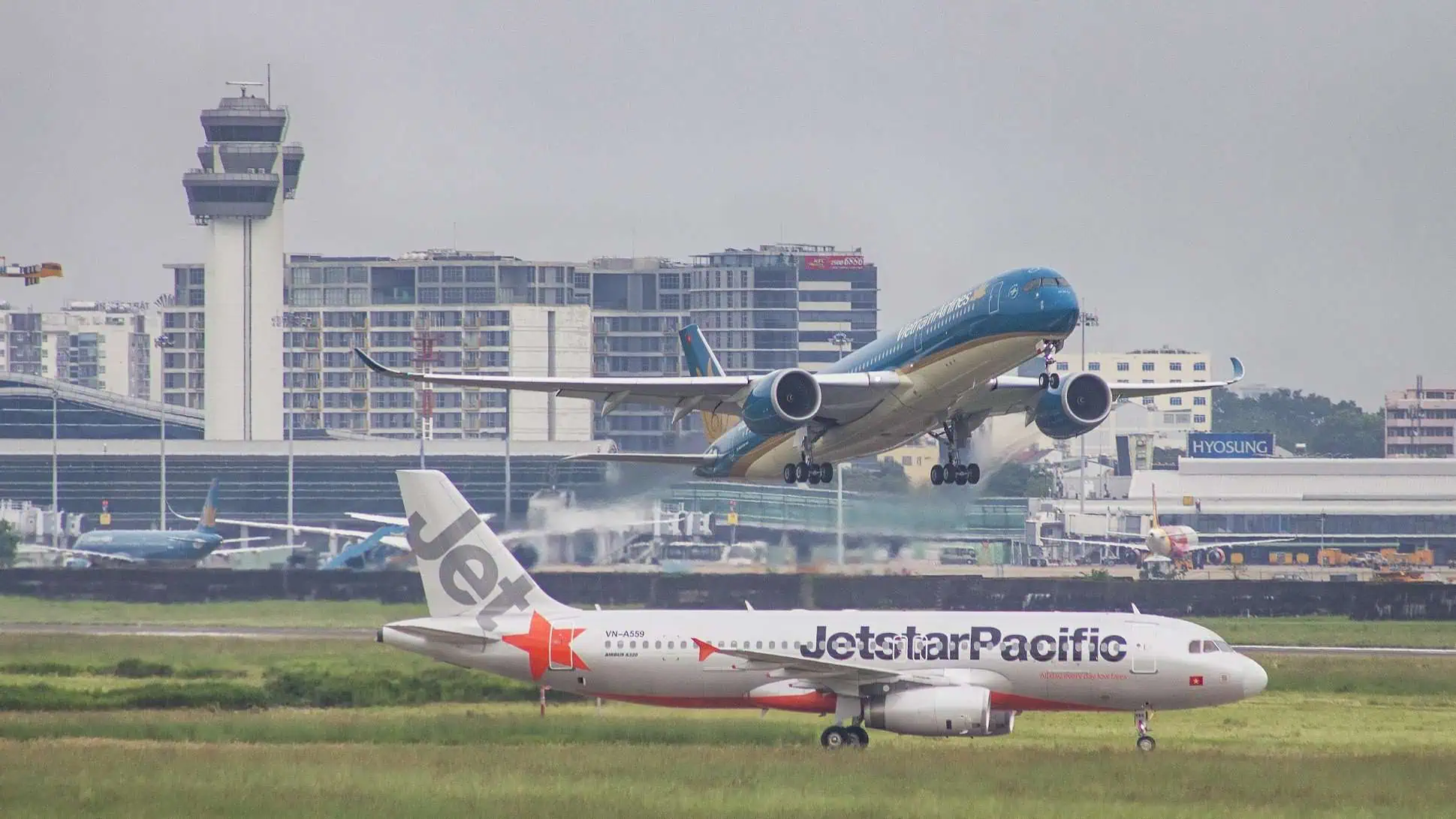
18. Sleeper Buses Are Really Really Cheap, And A Great Travel Option For Small Budgets
The sleeper buses in Vietnam are actually pretty amazing in their quality, making them great low-budget options. They’re obviously nowhere near as fast as planes, but they are very cheap (generally $6 for a 100-500km trip) and can get you almost anywhere you want to go. They are air-conditioned, clean, and each “seat” is also a bed that allows people 5’6” or smaller to actually stretch out and recline almost fully. If you’re over that height however, you’ll have to scrunch your legs a bit to lie down. The sleeper buses run every half hour until late at night, so buying a ticket at 11pm and getting a good night’s sleep while gliding down the highway isn’t hard to arrange. FUTA is the best company to use, and they have an easy online booking portal. You don’t need to book in advance to get the best fares.
Although a great value, there are 2 big issues you should consider before booking a sleeper bus:
- The bus drivers often drive like maniacs, so it can be nerve-racking and somewhat dangerous to take a sleeper bus if you are unlucky enough to get on one with a bad driver.
2. Luggage theft is common on Vietnam buses. The luggage hold is not really secure, and it is easy for the bus staff to get in there to go through the bags. So keep your valuables with you in the cabin is possible. If you travel with lots of suitcases, you probably shouldn’t risk taking the bus.
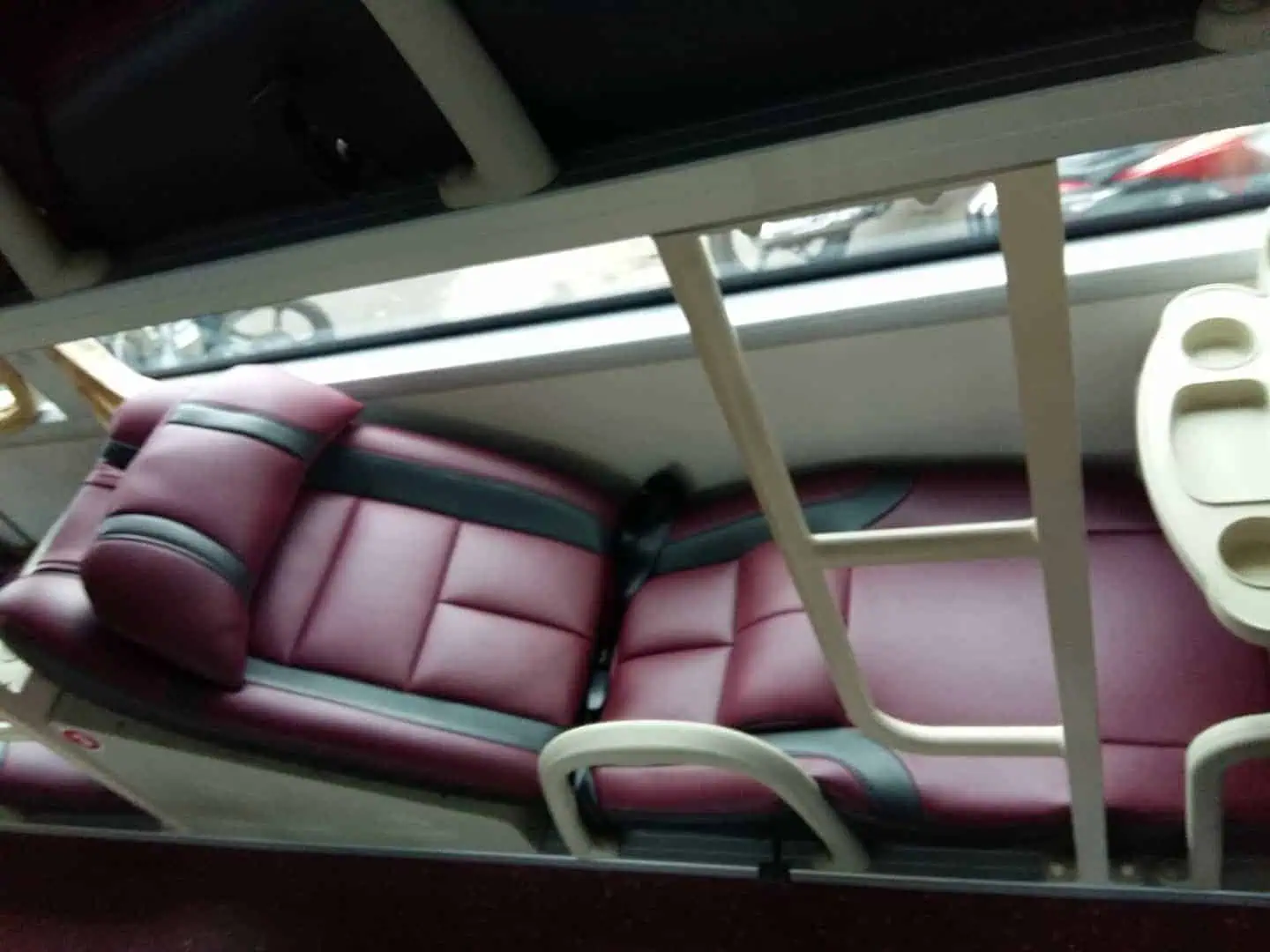
19. Pillowcases And Bedding On Public Transport Are Often Filthy
There are a few good options for traveling around Vietnam overnight. There’s the aforementioned sleeper bus, the train, and even boats if you are traveling in coastal Vietnam. If you decide to take an overnight transport, keep in mind that many Vietnamese travel companies often neglect to change the bedding used by previous customers so they can get quite disgusting. We would highly recommend that you bring your own pillowcase and buy a cheap sleeping bag liner you will find at many local markets; unless you don’t mind the risk of getting lice or strange rashes on your head and body.
20. You Won’t Be Allowed To Drive A Rental Car
There are lots of car rental agencies advertised in Vietnam but the person who rents the car won’t be allowed to drive it. International Driver’s licenses are not accepted in Vietnam so car rental businesses always include a driver here, even on long trips. Your driver will take you where you want to go and will usually rent cheap accommodations for him or herself if you need to stay overnight somewhere.
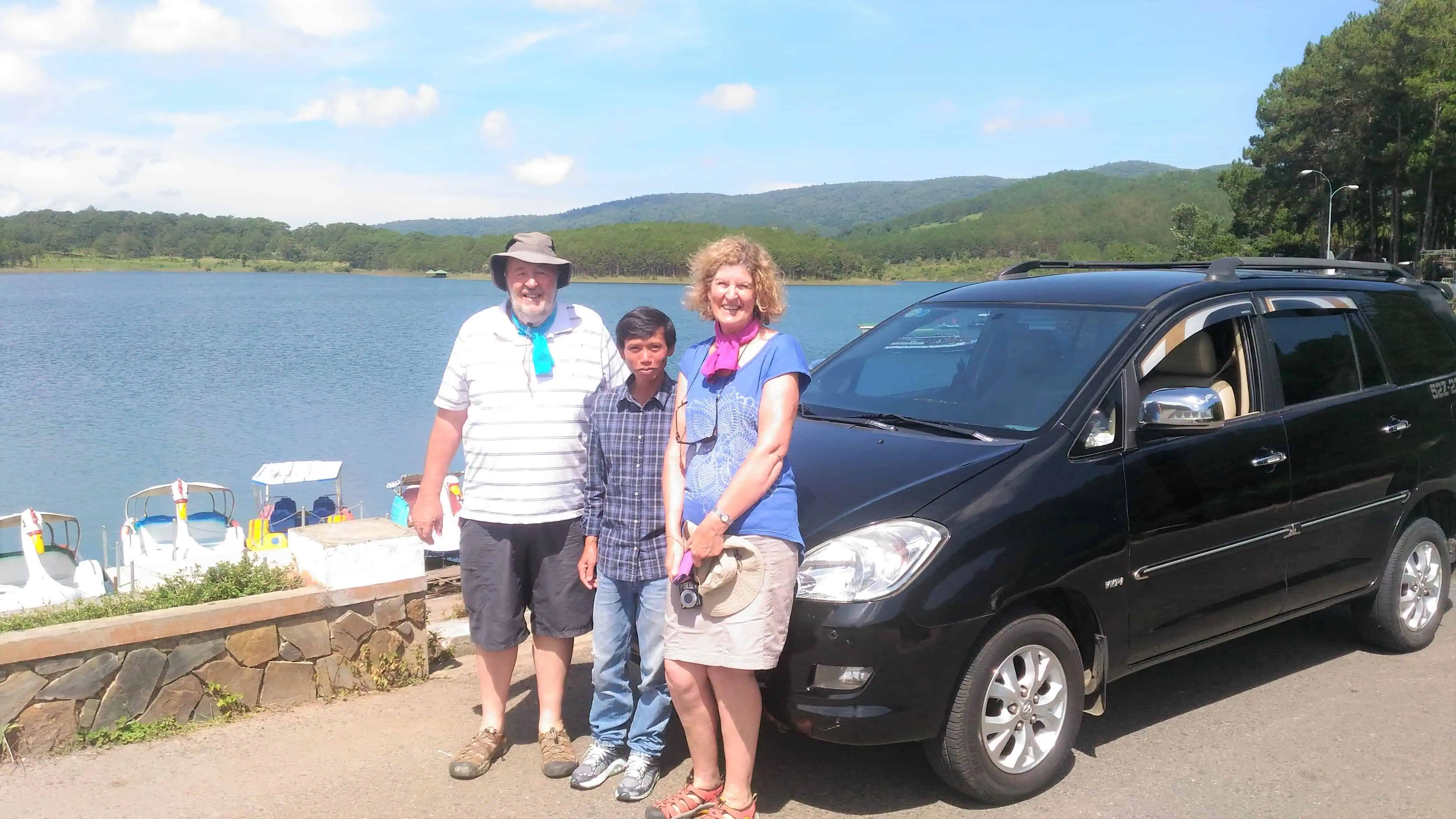
21. The Grab App Will Help You Avoid The Most Common Vietnam Scam
If there is one phone app no tourist should be without in Vietnam, it’s Grab. Grab is essentially the Uber of Southeast Asia, offering car and motorbike rides on demand. The app is easy to use and even allows you to set up digital payment with a credit card for added convenience. When you need a ride, you only need to choose whether you want a car or bike, enter a pick-up point and destination, and the app will give you a price. Tap “confirm” and you’re done.
Keep in mind however that the app will not work or allow you to set up a digital payment option before you enter Southeast Asia, so just download it
Of course, you will be able to download the app once you get to Vietnam but it’s easier to have it ready so that once you arrive in Vietnam you can use the app immediately for transportation to your accommodation.
There are fake Grab Taxi drivers at the airport that will tell you they work for Grab so you’ll pay the inflated rate they charge. Only book Grab through the app.
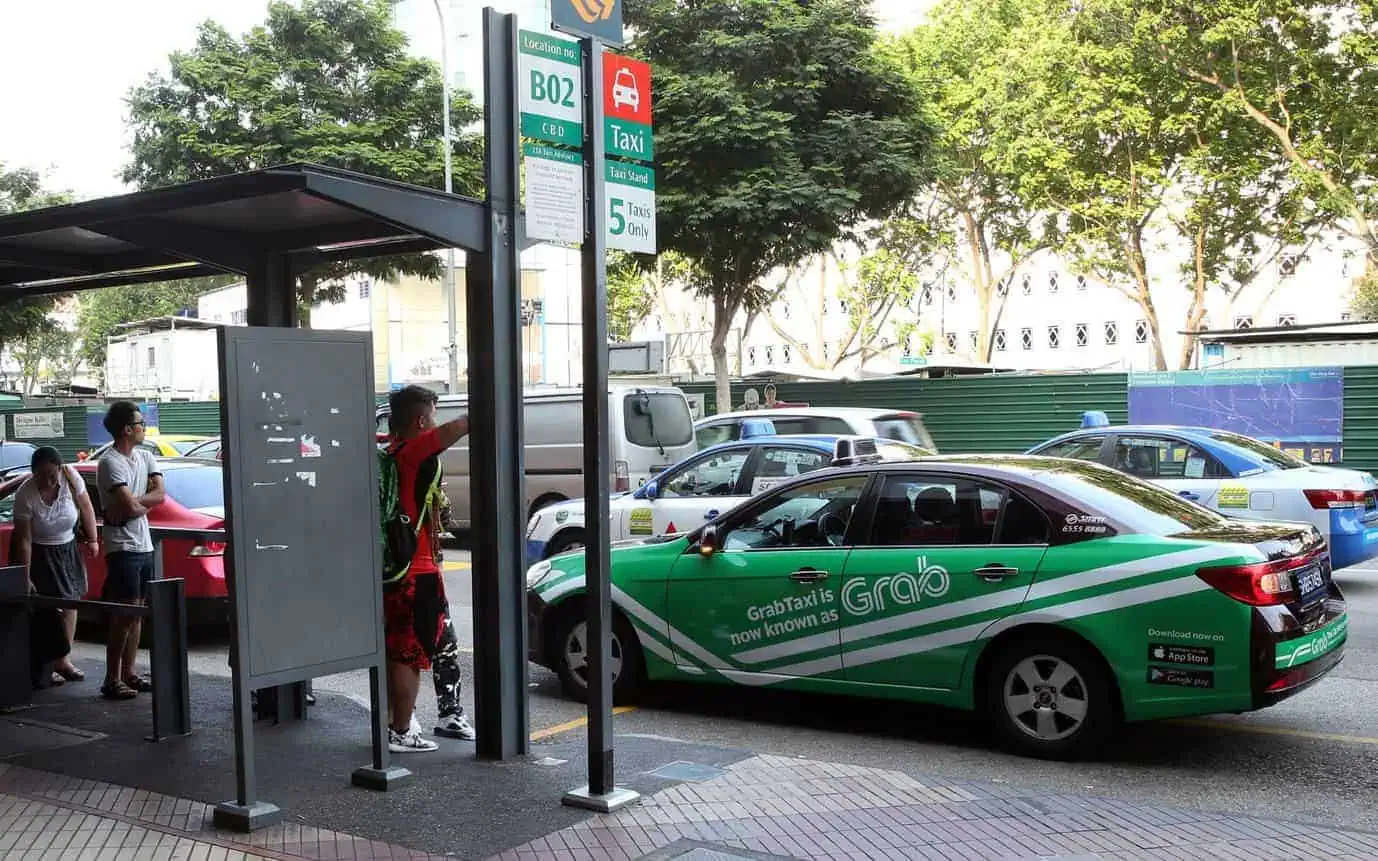
22. Vietnamese People Probably Won’t Take Your Food Allergies Seriously
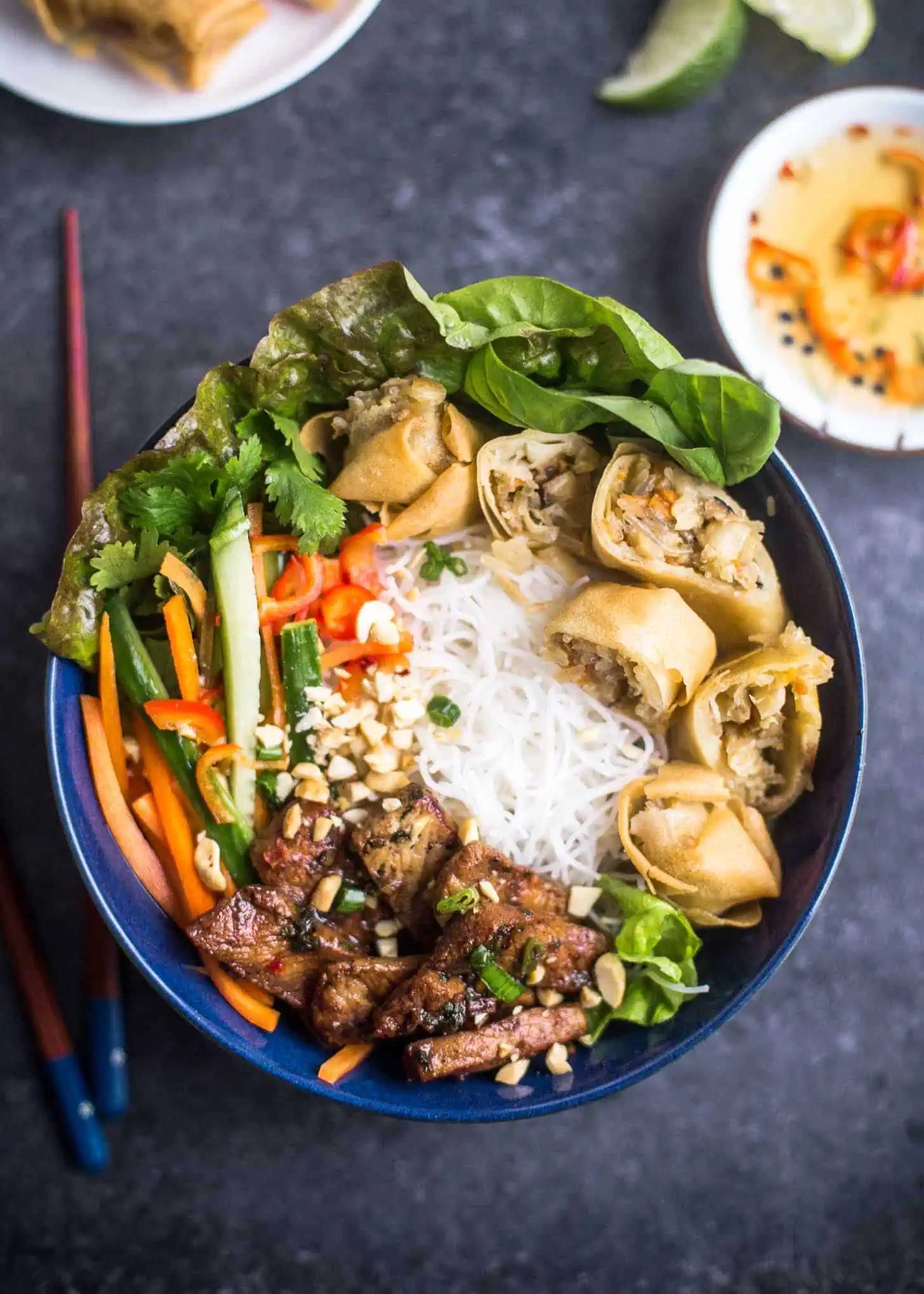
Food allergies are not something that is mentioned much in Vietnam. In fact, we can’t ever recall meeting a fellow Vietnamese person that has mentioned having a serious allergic reaction to any type of food. In contrast, food allergies are covered in western media regularly, with news of people getting seriously ill or even dying due to exposure to various types of food ingredients (e.g. peanut allergy). We don’t mean to imply that Vietnamese people are healthier than people in other countries or are more immune to developing food allergies. Our theory is that because food allergies are poorly understood in Vietnam, most of the Vietnamese people that had serious allergies probably died at a young age and didn’t have a chance to pass on their genes to future generations.
When we first started running food tours and mentioned that one of our guests had a serious food allergy to a certain ingredient, the cooks at most of the restaurants would just laugh it off and say that we could just pick out the offending ingredient from the dish. We had to emphasize to the restaurants that our guests could die from even the slightest exposure to said ingredient before they took the situation more seriously.
Even when the locals take precautions for allergies, they only look at the obvious ingredients that you can see and not the ones you don’t like what the cooking oil or fish sauce is made of. When we started XO Tours, we made a strong point to train our staff to understand the seriousness of food allergies and to also to have them talk to the restaurants we work with to know exactly what ingredients are used in the food we serve our guests on our tours. We doubt that many other tours in Vietnam that serve food do this.
If you have a serious food allergy and worried about eating food in Vietnam, we would highly recommend that you bring a translated note/card that you can show each restaurant you visit so they can understand the seriousness of your allergy. The blog post in the link provided below has some food allergy translations that you can print out:
23. What Is Legal In Your Country May Be Illegal In Vietnam
Did you know it’s illegal to take photos of any government building in Vietnam or fly drones in Vietnam without a permit? Or that it’s illegal ride on a motorbike with more than two people on it unless the 3rd person is a small child (7 years old or younger). And even if you have a international motorbike license it doesn’t mean you’re legal to drive in Vietnam since most international driver’s licenses are not recognized in Vietnam. Additionally, it’s illegal to join a crowd if the government deems that crowd to be involved in a protest, even if you did not know what the crowd was for when you joined it. These are just a few of the laws that travelers to Vietnam have had trouble with in the past, and they’re not exactly intuitive to westerners. So take some time to look up Vietnamese laws tourists should know; you don’t want to spend your vacation tangled up in Vietnamese legal proceedings with a big fine as a souvenir.
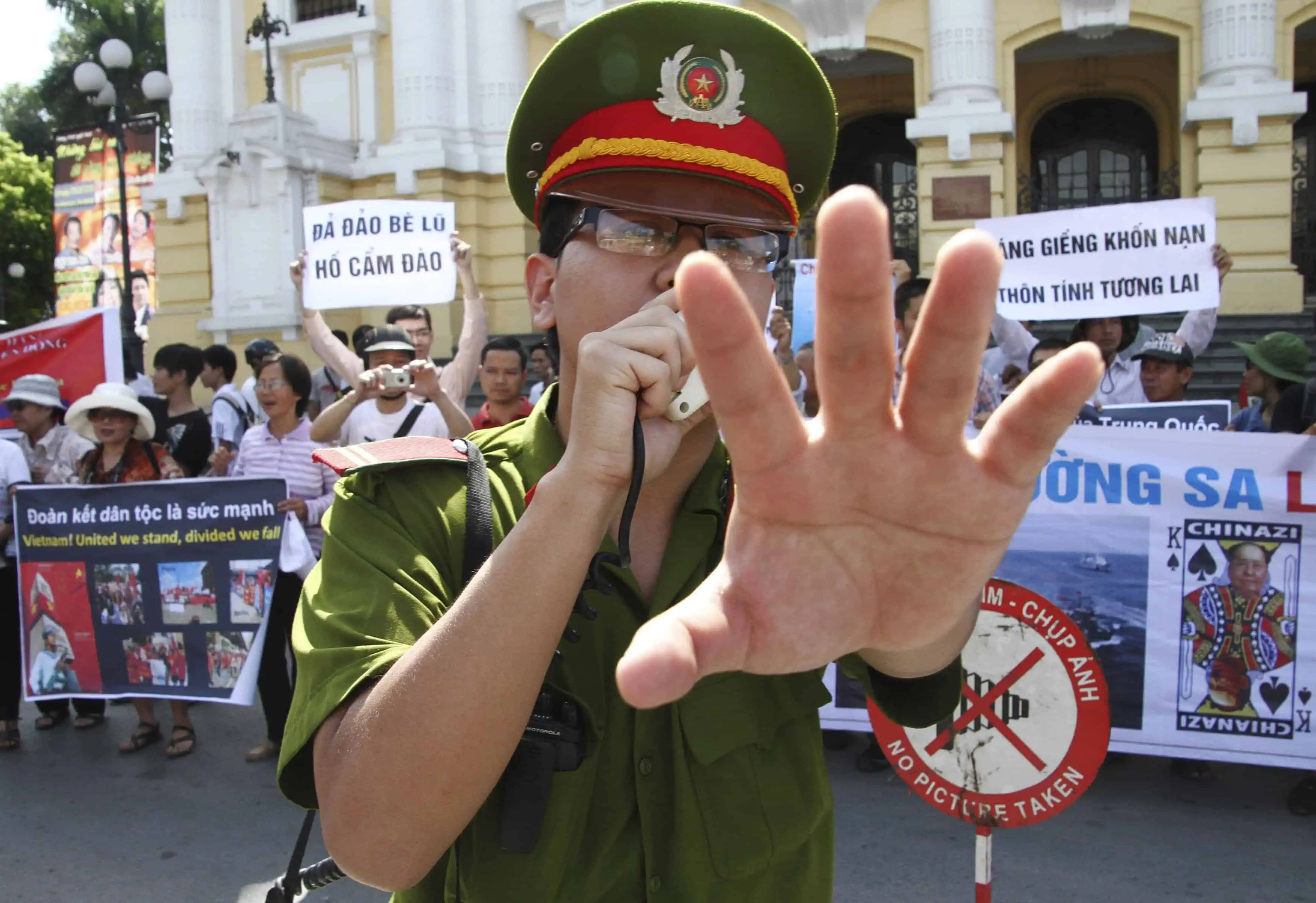
24. The Vietnam E-Visa Is The Best Visa Option For Most Travelers
A few years ago, the Vietnamese government began offering a cheaper, easier method for getting a Vietnam tourist visa. Previously, the simplest way to get a visa was by getting a Visa On Arrival, which involved paying a third-party agent to issue a digital invitation and then waiting in line at the Vietnamese airport to get the actual visa.
An E-visa is a 100% online visa issuing process that costs less and allows you to avoid Visa On Arrival queues. It’s available for citizens of most countries. Follow these steps to get one:
- Log onto the one and only official Vietnam E-visa site.
- Apply for a visa letter online at least a week before your trip. The processing fee is 25 USD.
- Print out the e-visa once it’s sent to you. It will take 3 to 6 days to arrive. Your e-visa should look similar to the image below.
- Bring the e-visa with you on your flight.
- Present your e-visa to the immigration clerk at the Vietnamese airport.
E-visas allow you to stay in Vietnam for 30 days. If you want to visit for longer, you will have to reapply for another e-visa, exit the country and enter again
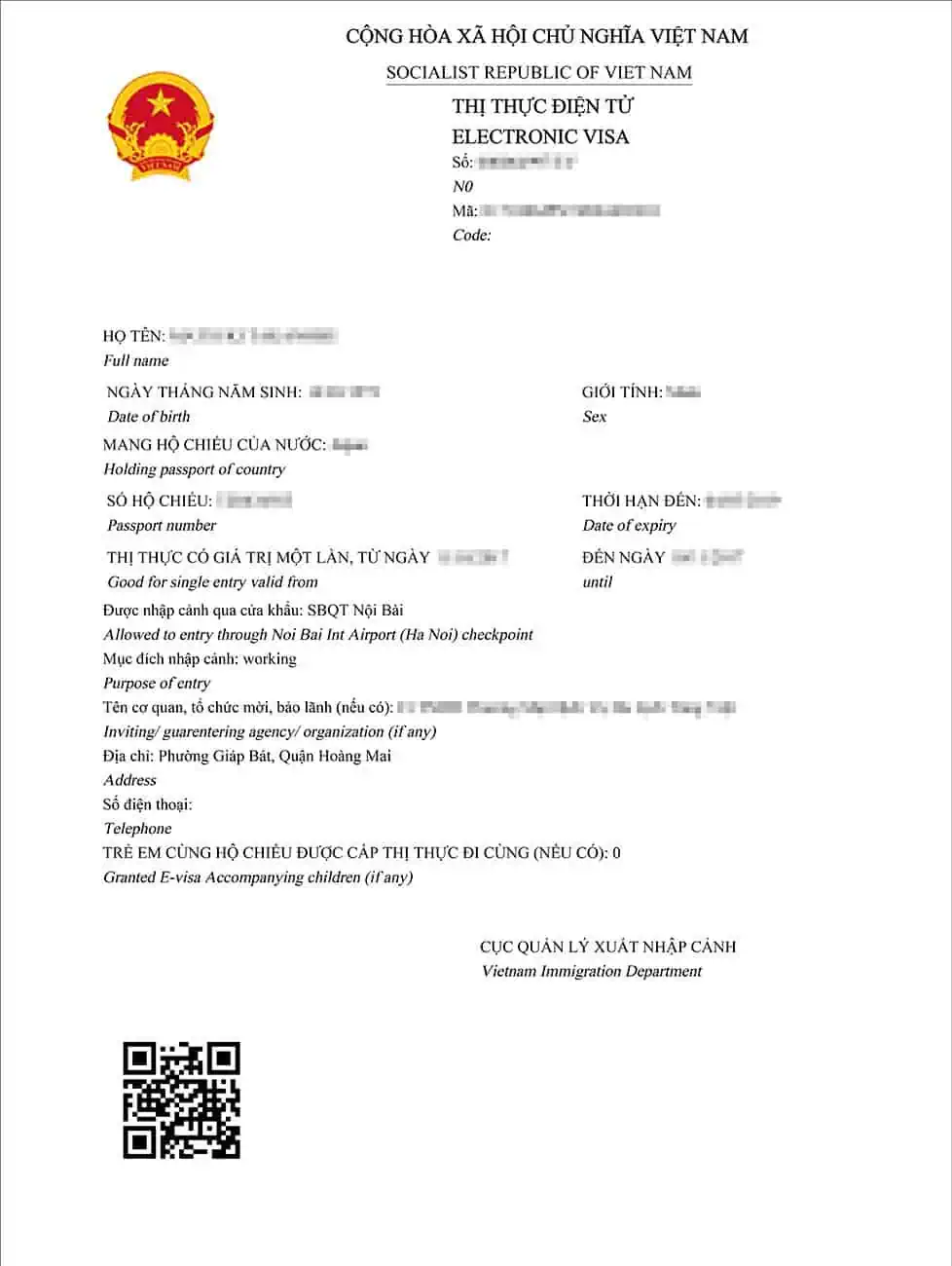
Any accomplished traveler will tell you one of the first rules of visiting a new country is to always come prepared. This advice is doubly true for Vietnam because the culture and customs are so different than in western countries. Hopefully, this blog post helps you to do just that.
Once you have your trip to Vietnam all booked and are ready to touch down, check out our “Guide for Your First Hour in Vietnam” which lists out the most important things to do after landing at a Vietnam airport. We think this guide is a tremendous help for navigating the airport especially for first-time travelers to our beautiful country!









